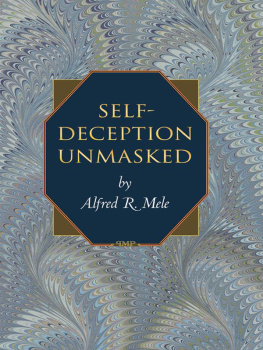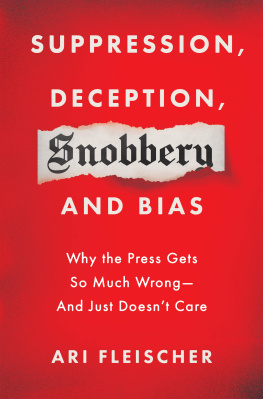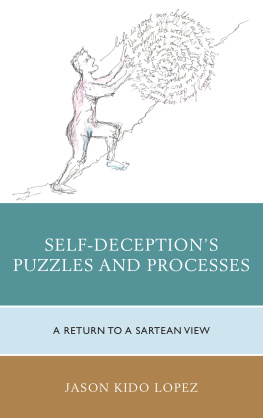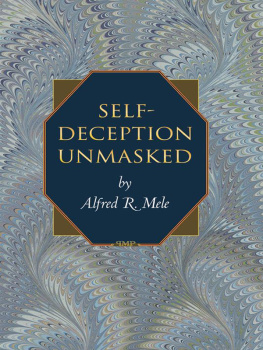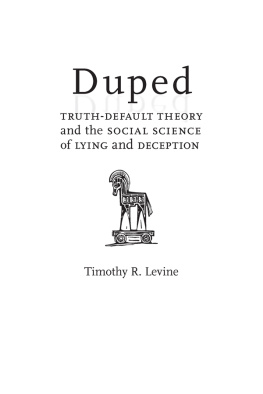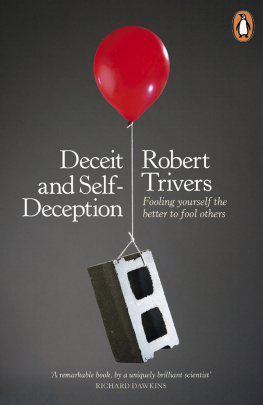Copyright 2001 by Princeton University Press
Published by Princeton University Press, 41 William Street,
Princeton, New Jersey 08540
In the United Kingdom: Princeton University Press,
3 Market Place, Woodstock, Oxfordshire OX20 1SY
All Rights Reserved
Library of Congress Cataloging-in-Publication Data
Mele, Alfred R., 1951
Self-deception unmasked / Alfred R. Mele.
p. cm. (Princeton monographs in philosophy)
Includes bibliographical references and index.
ISBN 0-691-05744-3 (hardcover : alk. paper)
ISBN 0-691-05745-1 (pbk. : alk. paper)
ISBN-13: 978-0-691-05745-3
Self-deception. I. Title. II. Series.
BD439. M45 2000
128'.3dc21 00-032626
This book has been composed in Janson Text and Centaur
The paper used in this publication
meets the minimum requirements of
ANSI/NISO 239.48-1992 (R1997)
(Permanence of Paper)
www.pup.princeton.edu
Printed in the United States of America
1 3 5 7 9 10 8 6 4 2
For my father, Al
Preface
WHAT MOTIVATED ME to accept Harry Frankfurt's kind invitation to submit a manuscript to this series was the opportunity to present and defend in a systematic way a position on self-deception that has evolved partly out of my earlier attempts to shed light on the phenomenon. Although I draw on previously published work, the defense offered here of my central theses about the kind of self-deception that has received pride of place in the philosophical and psychological literature is much more robust and has an important new dimension that benefits from recent empirical work on hypothesis testing. The general position on self-deception advanced here also is considerably more comprehensive than what I have been able to manage in my scattered efforts on the topic over the years.
I have been thinking about self-deception longer than it pleases me to acknowledge. My first stab at the topic (Mele 1982), a brief commentary on a provocative paper by Robert Audi (1982), contains some of the seeds of the position advanced in this book. My central point there was that there is no close general analogy between self-deception and intentional other deception and that when our attachment to this analogy is broken, there is significantly less motivation to postulate unconscious [true] beliefs in ordinary cases of self-deception (Mele 1982, p. 164). In Mele 1983, I offered a more rigorous defense of this point, a statement of characteristic and jointly sufficient conditions for self-deception, and a resolution of the static puzzle about self-deception highlighted in Chapter i. That article was the basis for Chapter 9 of Irrationality (Mele 1987a). Another chapter of Irrationality also tackled self-deception: in Chapter 10, drawing on some literature in social psychology, I offered a resolution of a puzzle about the dynamics of self-deception. These two chapters are a partial basis for two recent articles, Mele 1998b and Mele 1997a. The former was written as an invited contribution to a 1993 interdisciplinary conference on self-deception at Stanford University organized by Jean-Pierre Dupuy and subsequently published in a volume containing several of the papers presented there. Owing to the nature of the invitation, I was not bashful about borrowing from Irrationality, but I did branch out in two directions. I made use of new empirical literature that supported a central hypothesis about motivationally biased belief advanced in Irrationality and, at Dupuy's request, I examined a literary example of self-deception. (My discussion in Chapter 3 of Isaac Bashevis Singer's short story Gimpel the Fool derives partly from that paper.) Some time after the Stanford conference, I was invited to submit a target article to Behavioral and Brain Sciences. That article (Mele 1997a) is a wider-ranging and more heavily empirical descendant of the conference paper. It benefited from two rounds of revision prompted by fifteen referee reports.
In this book, I have borrowed liberally from published work of mine. Parts of Chapter 1 derive from three sources: Real S elf-Deception, Behavioral and Brain Sciences 20 (1997): 91102 (Mele 1997a); my reply to the BBS commentaries, Understanding and Explaining Real S elf-Deception, Behavioral and Brain Sciences 20 (1997): 12734 (Mele 1997b); and Motivated Belief and Agency, Philosophical Psychology 11 (1998): 35369 (Mele 1998a). Parts of Chapter 2 derive from Mele 1997a, Mele 1998a, and another article: Twisted S elf-Deception, Philosophical Psychology 12 (1999): 11737 (Mele 1999a). Parts of Chapter 3 derive from the same three articles as Chapter 1 and an additional source: Two Paradoxes of Self-Deception, in J. Dupuy, ed., Self-Deception and Paradoxes of Rationality (Stanford: CSLI, 1998), pp. 3758 (Mele 1998b). Parts of Chapter 4 derive from the same three sources as Chapter 1. Chapter 5 is based on Mele 1999a.
Naturally, I have learned from authors of published responses to my previous work on self-deception. For useful informal discussion and written remarks, I am grateful to Robert Audi, Kent Bach, Jim Friedrich, Rainer Reisenzein, and Bill Talbott. I also have benefited from the advice of two anonymous referees.
I completed the final revision of this book during my tenure of a 19992000 NEH Fellowship for College Teachers. (The fellowship supported work on another booktentatively entitled Motivation and Agencythat is well underway at the time of this writing.) Much of the revision was accomplished while I was a Visiting Fellow in the Philosophy Program in the Research School of Social Sciences at the Australian National University (June through August, 1999). I am grateful to the NEH and the ANU for their support, and to Davidson College for a 19992000 sabbatical leave.
Introduction: Approaches, Puzzles, Biases, and Agency
A SURVEY of university professors found that 94% thought they were better at their jobs than their average colleague (Gilovich 1991, p. 77). Are university professors exceptionally adept at self-deception? Perhaps not. A survey of one million high school seniors found thatall students thought they were above average in their ability to get along with othersand 25% thought they were in the top 1% (ibid.). One might suspect that the respondents to these surveys were not being entirely sincere in their answers. Then again, how many university professors do you know who do not think that they are better at what they do than their average colleague?
Data such as these suggest that we sometimes deceive ourselves. That suggestion raises some interesting questions. How do we deceive ourselves? Why do we deceive ourselves? What is it to deceive oneself? Is self-deception even possible? These questions guide my discussion in this book.
Some theorists understand self-deception as largely isomorphic with stereotypical interpersonal deception. This understanding, which has generated some much discussed puzzles or paradoxes, guides influential work on self-deception not only in philosophy but also in psychology, psychiatry, and biology. In the course of resolving the major puzzles, I argue that the attempt to understand self-deception on the model of stereotypical interpersonal deception is fundamentally misguided. The position on self-deception defended here is deflationary. If I am right, self-deception is neither irresolvably paradoxical nor mysterious, and it is explicable without the assistance of mental exotica. Although a theorist whose interest in self-deception is restricted to the outer limits of logical or conceptual possibility might view this as draining the topic of conceptual intrigue, the main source of broader, enduring interest in self-deception is a concern to understand and explain the behavior of real human beings.

